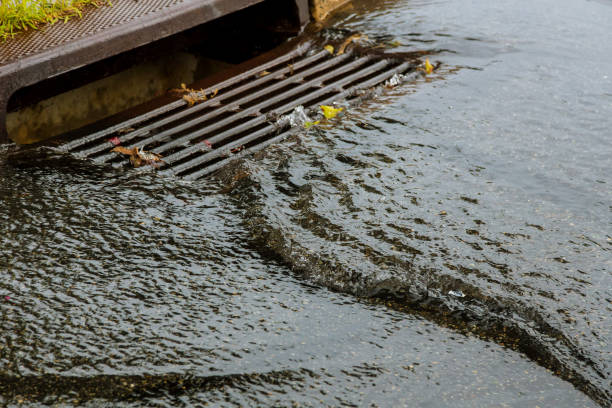As I sit at my desk this morning watching the rain come down, hit the pavement and run off into the storm drain, my first thoughts are not of the misery a rainy day can bring, but about how many pollutants are running off into our waterways. Did you know that 97.5% of the earth’s water is salt water and 2.5% is fresh water? That does not sound like enough fresh water to me; does it to you? How did I discover the above interesting facts? Well, let me tell you. . .
The term “stormwater” has recently been added to my conservation vocabulary. The earth’s water is replenished by stormwater; otherwise known as rainwater and/or melting snow. How rainwater and/or melting snow flows to rivers, lakes and streams is important, because stormwater runoff can be a carrier of pollutants, such as chemicals from pesticides, gas and oil from roadways and driveways, pet waste such as poop, and this is only to name a few. These pollutants are harmful to human health and wellbeing if too much is deposited into our waterways. What I have discovered is that a difference can be made with the smallest acts of conservation. It can be as simple as picking up after pets when they poop, proper disposal of lawn waste, cleaning up oil and gas spills, using less pesticides, and so many more. These practices can minimize pollutants in the rainwater and melting snow that runs off our lawns, driveways, roadways, and rooftops. Wow, something so simple can make such a big difference!
While learning about stormwater runoff, I discovered the wonders of a rain garden and rain barrels. The rain garden is a landscaped area that can be built in your yard where rainwater can be directed by use of gutters and downspouts. These gardens are built to allow water to be absorbed into the ground and become naturally filtered ground water. The ground water will eventually be added to other waterways. These gardens are planted with beautiful native plants which also aide in water absorption. The rain garden is not only appealing to the eye, but it also helps manage stormwater runoff pollution. Also, less water going to ditches and storm drains can reduce flooding. Collecting rainwater is not the only benefit of a rain garden. It makes a beautiful habitat for butterflies and other beneficial insects. Wow, so many benefits from one garden! Rain barrels are another way to capture rainwater and prevent stormwater runoff. Rainwater is directed to the rain barrel through gutters and downspouts on buildings. This water can be used to water plants, lawns, etc. Polluted rainwater can be kept from rivers, lakes, and streams one barrel at a time.
We have information regarding stormwater runoff, rain gardens, and rain barrels on our website and in the office. Please take a minute to check this out on our website or stop by and pick up some information up. I would love to say hi!
Our annual berry plant sale is going on now through April, 26th. | Order Online Today! • Our annual fish sale is going on now through April, 26th. Pickup day is May 7th. | Order Online Today! • We will be on Live At Noon on Monday, April 29, 2024 with NRCS.
